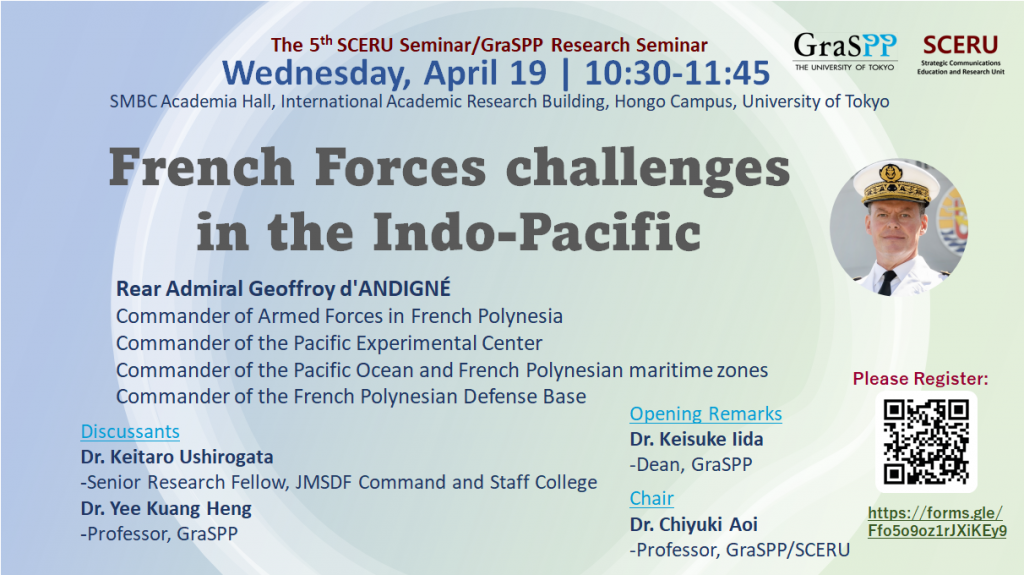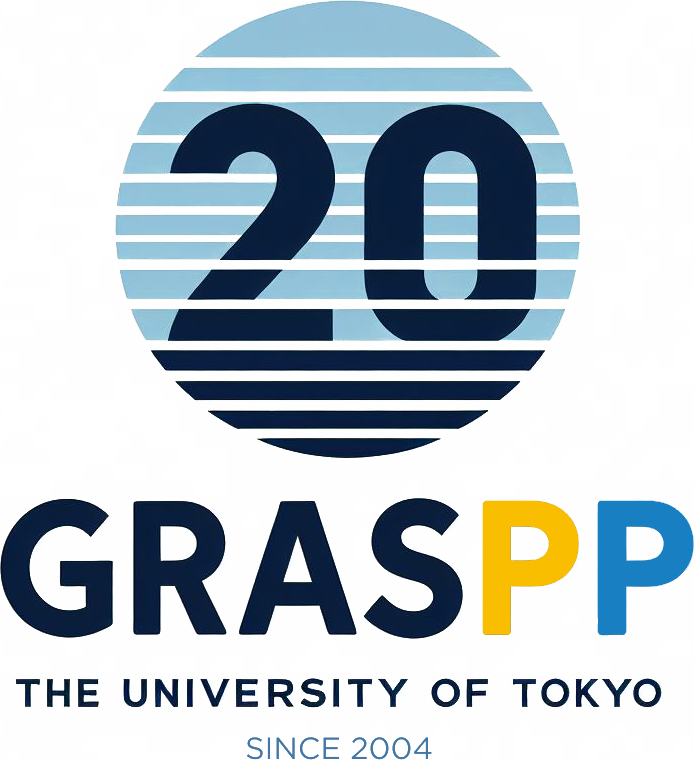
The Joint Commander of Armed Forces in French Polynesia, Rear-Admiral Geoffroy d’Andigné, will make a lecture on “French Forces challenges in the Indo-Pacific” on 19 April, from 10:30 at the University of Tokyo. As a nation of the Indopacific, with territories, people and permanently stationed armed forces, France is an active regional defense and security stakeholder, contributing to preserve stability. RADM d’Andigné will lay out how France responsibly defends its sovereign interests in the multilateral rules-based order it promotes, detailing the means, main missions, areas of deployments and military cooperation ways of the French Forces in the Pacific.
Date & time
Wednesday, April 19, 2023 | 10:30-11:45 (JST)
Venue: SMBC Hall, 4th floor, International Academic Research Building, Hongo campus
Language
English
Program
Opening remarks by:
Dr. Keisuke Iida, Dean and Professor GraSPP
Speech by:
Rear Admiral Geoffroy d’Andigné,
Commander of the Armed Forces in French Polynesia
Commander of the Pacific Ocean and French Polynesian maritime zones
Commander of the Pacific Experimental Center
Commander of the French Polynesian Defense Base
Panel Discussions with:
Captain Keitaro Ushirogata, Senior Research Fellow, JMSDF Command and Staff College
Dr. Yee Kuang Heng, Professor GraSPP
Chair:
Dr. Chiyuki Aoi, Professor GraSPP/SCERU
Registration
Please register here.
About the speaker
Rear Admiral Geoffroy d’Andigné is Commander of the Armed Forces in French Polynesia, Commander of the Pacific Ocean and French Polynesian maritime zones, Commander of the Pacific Experimental Center and Commander of the French Polynesian Defense Base. He is an officer of the Legion of Honor and the National Order of Merit.
He studied at the Ecole Navale and the Ecole de Guerre. He served on the aviso (sloop) Commandant Bory in the Red Sea ARTIMON operation of 1991 and conducted operations
in the Mediterranean aboard the SNA Améthyste. Then he took part in the MEDOR and MYRRHE 2000 missions in the Indian Ocean aboard the frigate Tourville, before taking command of the aviso Lieutenant of vessel Lavallée which was involved in the CORYMBE mission in the Gulf of Guinea in 2003. His subsequent career includes: Head of the navy’s BERYX operation cell at the CPCO following the tsunami in Sumatra, Head of the “studies” section of the “fleet crews and port sailors” office of the Navy’s military personnel management(2006), Director of Instruction on the helicopter carrier Jeanne d’Arc(2008 to 2010), participation in the ATALANTA mission, Chief of Staff of the Maritime Prefect of Brest(2010, including when the TK Bremen grounded in Erdeven), Commander of the anti-submarine frigate La Motte-Picquet(2012-2014) to lead three operations in support of dissuasion, Auditor at the NATO Defense College in Rome, and various leading positions of the Armed Forces General Staff(since 2015). He worked in particular on the military programming law and the modernization of the Armed Forces Ministry. In 2021, he joined the naval staff as deputy “finance and support” force preparation officer and was appointed to the current position in August 2022.
Discussants
Captain Keitaro Ushirogata is Senior Research Fellow, Japan Maritime Self Defense Force (JMSDF) Command and Staff College. His major publications include: Kaiyo-Senryakuron, in Japanese(Comparative Analysis of Maritime Military Strategies -Area Denial, Sea Control, and Power Projection)(2019) and “Ousyu to Asia ni okeru kaku no shikiichi”, in Japanese (The Difference of Nuclear Threshold between Europe and Asia -Gedanken Experiment as to Non Strategic Nuclear Weapons) (Co-authored, 2023), edited by Iwama Yoko, Kakukyoyu no Genjitsu -NATO no keiken to Nihon (The Reality of Nuclear Sharing Arrangement -NATO’s Experience and Japan). He obtained his bachelor’s degree in Social Studies from National Defense Academy and earned MA in Policy Studies(2014) and PhD in International Relations(2017) from GRIPS. In JMSDF, he served as Operations Staff at Head Quarter Training Squadron, Navigation Officer of JS Mineyuki, Navigation Officer of JS Atago, Operations Staff at Headquarter Escort Fleet Force, Researcher at JMSDF Command and Staff College, and Deputy Counsellor at the National Ocean Policy Secretariat, Cabinet Office, Government of Japan.
Dr. Yee Kuang HENG is a Professor at the Graduate School of Public Policy, The University of Tokyo. After completing his BSc (First Class Hons) and PhD in International Relations at the London School of Economics and Political Science, Dr. Heng held faculty posts lecturing at Trinity College Dublin, Ireland; the University of St Andrews in Scotland, and the National University of Singapore. In 2022, he was a Senior Academic Visitor at the University of Cambridge’s Centre for the Study of Existential Risk. Current research interests include future ecosystems and existential risks; UK-Japan defense cooperation, and more broadly Japan’s military exercises with European powers in the Indo-Pacific. Recent publications include “UK-Japan military exercises and mutual strategic reassurance”, Defence Studies (2021); and “Japan’s significance for the United Kingdom’s shaping ambitions in the Indo-Pacific”, East Asian Policy (2022).
Introductory remarks
Dr. Keisuke Iida is Dean and Professor in the Graduate School of Public Policy at The University of Tokyo. His area of specialization is International Political Economy. His major publications include Legalization and Japan: The Politics of WTO Dispute Settlement (2006) and Japan’s Security and Economic Dependence on China and the United States (2017). He has published numerous articles in international journals such as International Organization, Public Choice, International Studies Quarterly, and the Journal of Conflict Resolution. His research interests include the politics of trade, the political economy of financial crises, and the interactions between security and economics. He received his Ph.D. in Political Science from Harvard University. He has formerly taught at Princeton University and Aoyama Gakuin University.
Chair
Dr. Chiyuki Aoi is a Professor of International Security at the Graduate School of Public Policy, the University of Tokyo. She also serves as a member of the Editorial Board of Defence Strategic Communications, the official journal of NATO Strategic Communications Centre of Excellence. Since June 2022, she directs Strategic Communications Education and Research Unit (SCERU), established at GraSPP with support from the European Union.
Aoi was educated at Sophia University (BA), the University of Tokyo (transferred to MIT), the Massachusetts Institute of Technology (MS), and Columbia University (PhD). From 2008 to 2009, she was Visiting Research Fellow at the Department of War Studies, King’s College London, and from 2019 to 2020 Visiting Professor there.
In August 2018, she was elected a member of the Shinzo Abe Administration Council on Security and Defense Capabilities.
About SCERU
The Graduate School of Public Policy (GraSPP) at the University of Tokyo, with European Union (EU) support, has established a Strategic Communications Education and Research Unit for conducting a collaborative programme on research and education on Strategic Communication. The Unit will organize teaching, public research, and professional seminars on Strategic Communications, with a particular focus on bringing together perspectives and professional experiences from Europe and Japan. Through the work of the programme, Japanese and European perspectives on Strategic Communication can be shared, reinforcing the EU-Japan strategic partnership, and supporting efforts to overcome common problems including the rise of disinformation and foreign information manipulation and interference (FIMI).


